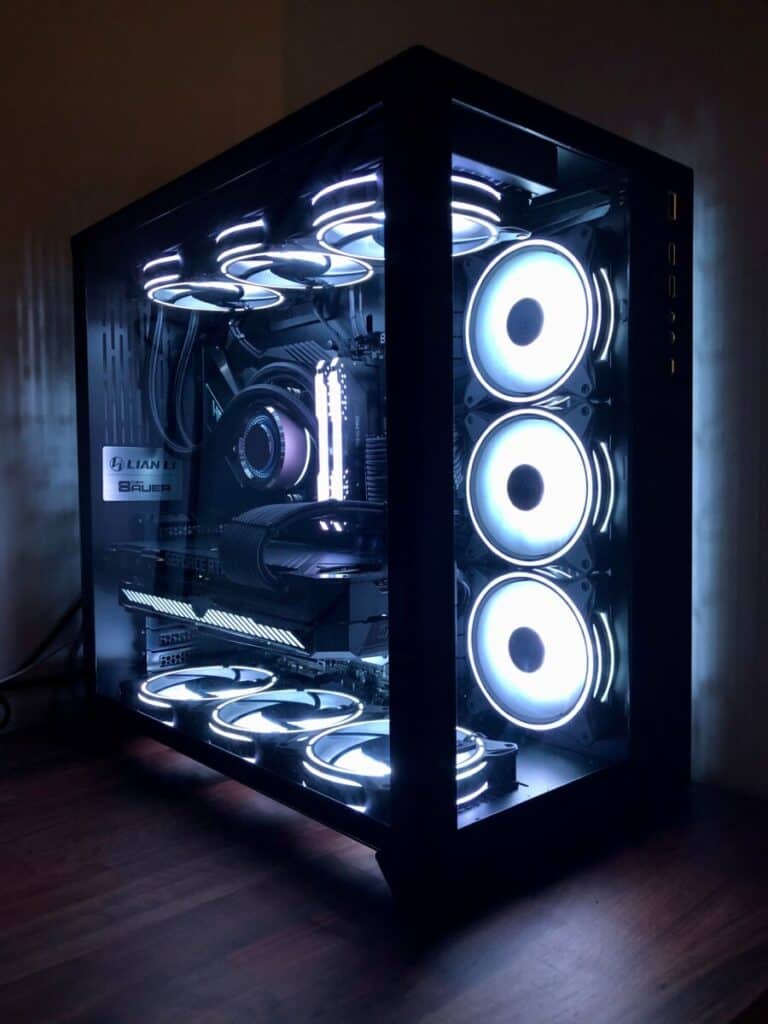
Whether it is a laptop, desktop PC, or any device you use, surely you would want it to be fast? But most users do not know the right way to make a computer fast. So, how can you make your computer operate fast?
By using a faster SSD, removing unnecessary files, closing unused tabs, organizing desktop icons, and updating RAM, you can make your computer work faster. Parts like the processor, cache, RAM, hard drive, graphics card, etc., also improve the computer’s speed.
Different computer parts enhance the overall speed of your system. There are also a few simple yet effective approaches to boost your computer speed. Keep reading to learn more about them.
Which Things Make a Computer Fast?
Even though computers and their internal parts are getting smaller, they are still highly complex. Therefore, the fastest PCs or laptops are not made up of one part alone; rather, they are a combination of several parts.
I will go through each part that contributes to the speed of the computer in more detail below. However, certain parts of computers have a greater impact on speed than others.
Processor (CPU)
Central Processing Units (CPUs) play an essential role in determining how fast your computer runs. CPUs that are slow and weak limit the speed of your computer. The purpose of this part, as the name implies, is to process data and read and execute program instructions.
A computer’s “clock speed,” then, is how fast it can perform this task. So, the more instructions the CPU processes per second, the faster it will perform.
The Intel 4004 could process 92,000 instructions in a second and has a processing rate of 740 kHz. Modern computers include multi-core CPUs, which means they are equipped with multi-core GHz processors.
Due to that fact, they can simultaneously execute multiple instructions. It is estimated that today’s computers can handle billions of instructions every second.
However, people become impatient with slow computers due to our increasing demands and needs. To ensure your computer is fast, you very well may need a sufficient CPU for its needs.
A dual-core CPU should be enough if you only plan to do basic stuff on your laptops, such as browsing the internet and editing texts. Those who plan to play advanced games, work on 4K videos, or do design work will need a computer with at least four processor cores.
Cache
Computer speed is also significantly influenced by the cache. Computers today can process as many as 100 billion instructions per second, but they are restricted by other parts, primarily memory such as cache and hard drive.
The CPU and memory transfer data to and from the cache and other components in the computer via the cache. Having more cache is what makes the computer fast and efficient. When looking for a computer that runs fast, you should look for level 2 or 3 caches.
RAM
RAM, also known as working memory, differs from a hard drive, discussed later. A RAM file is used to keep track of progress within the working process.
RAM is used to store short-term data. Hence, more RAM can be better up to a certain limit. Your computer will need to send some of the data that it is holding to the hard drive if it runs out of memory.
In addition, this method adds two extra steps and the fact that the hard drive is much slower than the RAM results in slower processing speed.
Having more RAM on your computer will facilitate running more programs simultaneously. There are specific programs that will consume a lot of RAM on your computer.
Ideally, a significant amount of RAM is preferable, at least 8 GB, and ideally 16 GB if you plan on multitasking with some advanced programs.
Hard Drive or SSD
Besides serving as storage, the hard drive also influences the performance of your computer. Data will depend on the type of hard drive whenever it needs to be stored on or retrieved from it.
The computer’s performance is affected by the speed of the moving parts on traditional hard drives. Your HDDs should then be configured with the highest RPM possible in that case.
However, if you are looking for the fastest computer possible, you’ll need one with a Solid State Drive (SSD), which uses flash memory which is faster. SSDs outperform HDD when it comes to speed.
Bus Speed
An important aspect of computer performance is the speed of the bus. Different circuits are connected to a computer’s motherboard, including the CPU, memory, and bus.
Hence, your computer will run faster if the bus can handle more data simultaneously. FSB is the standard unit of measurement for bus speed and is measured in MHz.
A typical FSB speed range from 66MHz up to 800MHz. A high-speed FSB on a motherboard will help you build the fastest possible computer.
Graphics Processing Unit
Video cards or GPUs are also part of the hardware components that make your computer fast. Whatever laptop you use, the GPU plays an important role, especially when considering demanding graphical tasks.
GPUs manipulate and alter memory rapidly to display images on a screen as quickly as possible. A fast graphics card is essential for gamers and designers.
In terms of video cards, they can either be discrete or integrated. Since discrete units have their memory, they are usually better than integrated, using the computer’s memory.
Nvidia and AMD are the two leading companies offering discrete graphics. Video cards with 8GB or more RAM will cost quite a bit, so plan accordingly.
Cooling System & Power supply
Additionally, you should consider the cooling system and the power supply. However, it indirectly affects the computer’s speed and should be mentioned here, although they don’t directly affect it.
Your computer requires more cooling if it has advanced equipment. Your computer will run faster if you maintain the optimal temperature.
You can choose an air cooler or a water cooler to control the computer temperature depending on your preference. Most laptops rely on air cooling; however, installing a cooling water system may increase performance and speed while limiting overheating if you want to build an advanced gaming PC.
In addition to a power supply, you need it for your computer to function. If you are using an adapter, ensure it has the right voltage and amperage. Most of the time, the original charging cables and power cords will be used as conversion devices.
So, your computer could be permanently damaged by an insufficient power supply, causing it to not only slow down but also to crash.
Operating System
An important aspect of speed is the operating system you use with your computer. Computer hardware and computer software communicate via the operating system, which is typically a software program.
You interact with the computer through it. It is how the computer works as a whole. You should update the operating system regularly for it to function at maximum speed.
Several safety features could also cause a delay. Operating systems can be made more efficient and faster; you should research which settings to use.
Software
Your computer might have various programs, as well as games that could be slowing down your computer. In some cases, the most impactful pieces of software are those running in the background.
If you are not using certain pieces of software, make sure to delete them. Regularly updating your programs will help you achieve maximum performance. Additionally, you can adjust which programs will run automatically at startup by going to the settings.
What Are the Methods to Make Your Computer Faster?
Check the Hard Disk Space
For optimal performance on your computer, you should leave 15% of your HDD or SSD space unused. You might want to clean your computer if you only have 15% free right now.
Although cleaning programs are also available, manually checking the hard drive is more efficient.
Close Extra Tabs
Many users open dozens of tabs simultaneously. Even though you’re keeping your tabs open because you intend to access them, don’t forget that you can bookmark those tabs and reopen them whenever they’re needed. Furthermore, most browsers allow you to reopen closed tabs so that you can close the window completely.
Eliminate Useless Files
It is likely that your computer contains many files you do not use and will not use in the future. Additionally, your computer is slowed by temporary files created during installation processes, caches, as well as cookies you downloaded from the internet. These are easy to remove. You can remove them with CCleaner on Mac.
Prevent Random Programs from Starting
Numerous programs start automatically when your computer is turned on. You may not realize that some apps are running in the background.
Many background programs on your computer are not essential but slow down your computer, so you should prevent them from starting if you want your computer to work fast. Before doing anything, you should backup your data.
Repair Disk Permissions
In addition to preventing problems, proper permissions can also speed up computer performance.
Erase Browsing History
You are automatically storing the history of your browsing through your internet browser. It could slow your computer down by taking up memory. Consequently, make sure that you periodically clear your browser’s history.
